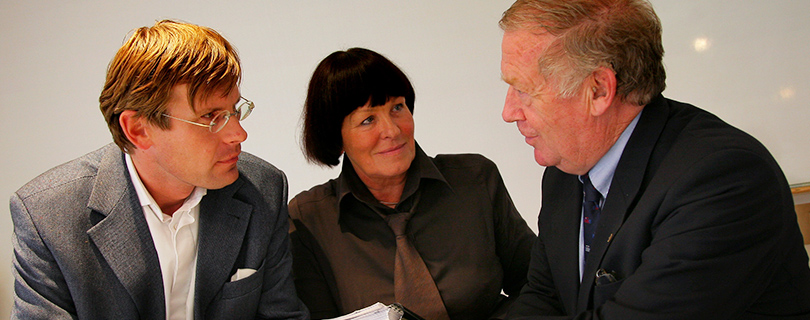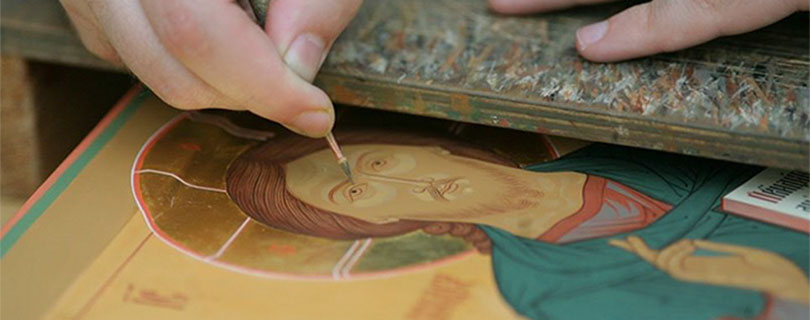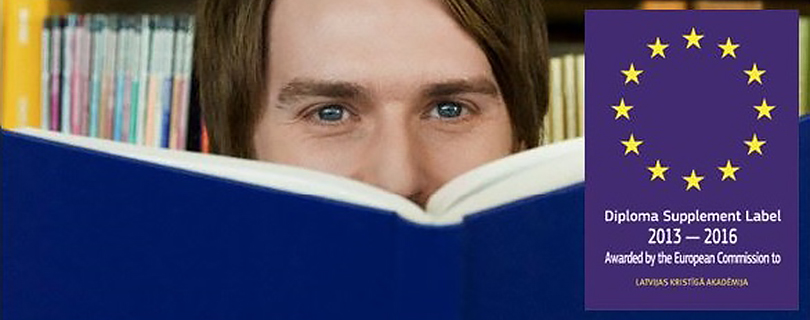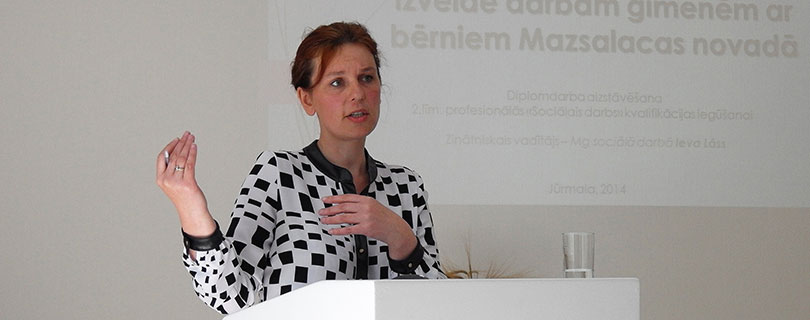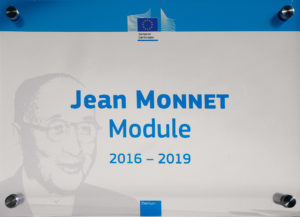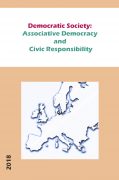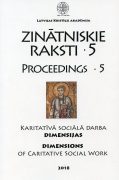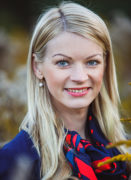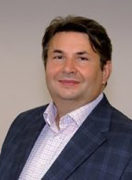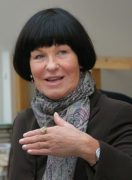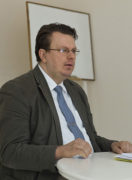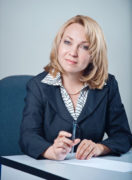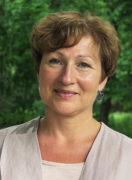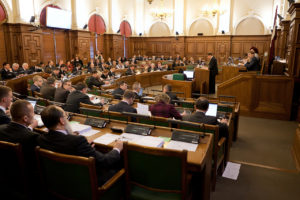European Christian academy has received an awarding ERASMUS+ “Jean Monnet Module” Plaque from EC EACEA (Education, Audiovisual and Culture Executive Agency) in May, 2017. As the following letter states, “The purpose of this plaque is twofold. It serves primarily as a label signifying quality in European integration studies and represents the achievements of your Jean Monnet Module in this field. At the same time it also provides visibility for the Jean Monnet Action, presenting it as focal point within and outside your institution for the promotion of European issues.”
EXCELLENCE OF EUROPEAN STUDIES
Study year 2018/2019.
Every student is asked to address director of Study department Agnese Sējāne akademija@kra.lv and register for Jean Monnet Module studies following your study plan (changes may appear):
Module studies from September 14, 2018.
Venue: European Christian Academy, Vienības prosp. 23, Jūrmala.
Friday, 10.15 – 17.00; Saturday, 10.15 – 17.00.
Apmācība modulī sākas 2018. gada 14. septembrī
Nodarbības notiek Eiropas Kristīgajā akadēmijā, Vienības prosp. 23, Jūrmalā.
Piektdienās 10.15. – 17.00; Sestdienās 10.15 – 17.00.
Prof. Liesma Ose
| European Social Market Economy.
Topically content will be given at the 1st lecture. Assignment: Research. The identification of aspects of the Social Economy in the national context of Latvia:
|
Eiropas tirgus sociālā ekonomika.
Ar nodarbību satura programmu iepazīstinās pirmajā lekcijā. Patstāvīgais pētījums: Sociālās ekonomikas aspektu identificēšana Latvijas kontekstā:
|
| September 14-15, 2018.
Caritative social work; Bachelors and Masters. 1st semester, 14 hours. Assignment at the Study department of the Academy – December 17, 2018. |
2018. gada 14.-15. septembris.
Karitatīvais sociālais darbs; Bakalauri un Maģistri. 1. semestris, 14 stundas. Pētījumu iesniegt Studiju daļā līdz 2018. gada 17. decembrim. |
Dr. Ivars Indāns
Associative Democracy Development in European Union.
Asociētās demokrātijas attīstība Eiropas Savienībā.
| October 26-27, 2018.
Caritative social work; Bachelors and Masters. 1st semester, 16 hours. Assignment at the Study department of the Academy – December 17, 2018. |
2018. gada 26.-27. oktobris.
Karitatīvais sociālais darbs; Bakalauri un Maģistri. 1. semestris, 16 stundas. Pētījumu iesniegt Studiju daļā līdz 2018. gada 17. decembrim. |
Asoc. prof. Aivars Stankevičs
Anthropological Discourse in the Context of Methodological Innovations of Social Entrepreneurship.
Antropoloģiskais diskurss sociālās uzņēmējdarbības metodoloģisko inovāciju kontekstā.
| February 1-2, 2019.
Caritative social work; Bachelors and Masters. 2nd semester, 18 hours. |
2019. gada 1.-2. februāris.
Karitatīvais sociālais darbs; Bakalauri un Maģistri. 2. semestris, 18 stundas. |
Dr. oec. Lāsma Līcīte
Structure Development and Management of Social Entrepreneurship.
Sociālās uzņēmējdarbības struktūras un menedžmenta attīstība.
| February 15-16, 2019.
Caritative social work; Bachelors and Masters. 2nd semester, 18 hours. |
2019. gada 15.-16. februārī.
Karitatīvais sociālais darbs; Bakalauri un Maģistri. 2. semestris, 18 stundas. |
Dr. oec. Ņina Linde
Capital, Investments and Foundations of Social Entrepreneurship.
Kapitāls, investīcijas un fondi sociālajā uzņēmējdarbībā.
| March 8-9, 2019.
Caritative social work; Bachelors and Masters. 2nd semester, 14 hours. |
2019. gada 8.-9. marts.
Karitatīvais sociālais darbs; Bakalauri un Maģistri. 2. semestris, 16 stundas. |
Attention for students!
Please use references to materials useful for discussions:
Franz H., Hochgerner J., Howaldt J. Challenge Social Innovation. Springer, 2012.
Hulgard L. Discourses of Social Entrepreneurship: Variations of the Same Theme? EMES, 2010.
First academic meeting for supporting teaching activities – Round-table discussion was held on “Challenges of Social Entrepreneurship Development in Latvia”, European Christian academy, October 5, 2017.
Many stakeholders from politicians, HEIs, entrepreneurs, trade-unionists spent time together in discussions how more effectively develop ideas of SE in accordance with European Integration Standards.
The planned impact on policy makers resulted in adoption of the Law “On Social Enterprises” in April 1, 2018.
no images were found
Registration for participation in the second academic meeting – Seminar for supporting teaching activities “Development of new forms of work – Social Entrepreneurship in the EU countries. Future of Work” will be open on May 23-25, 2019, at the Study department of European Christian Academy.
Important information: due to discussions about “European White Paper on Future of Europe” (2017) the topic of the Conference will be slightly extended and you have registered yourselves to the topic “Development of New Forms of Work – Social Entrepreneurship in the European Union Countries. Future of Work”.
Our Module education is focused on European Social Entrepreneurship future, consequently, its connection to the White Paper is obvious.
EUROPEAN SOCIAL ENTREPRENEURSHIP
WITH THE FUTURE.
SUMMARY OF THE PROJECT.
The Module “European Social Entrepreneurship with the Future” (ESEF) is part of European action which aims at stimulating teaching, research and reflection in the field of European integration studies in the form of Social Entrepreneurship (SE). Main purpose is stimulating of more extensive knowledge and professional interest on the SE development for students who do not come automatically into contact with European studies: Theology & religion studies, Church art, and Social work students. Module will foster creation of entrepreneurial spirit as the way of thinking and concrete action. There will be implemented a website, roundtable debate and international conference together with European Centre of Workers’ Questions (EZA) on European SE processes, results of which will be disseminated to all 39 European partner institutions of EZA through EZA. Planned roundtable debate with Latvian policy makers aim to initiate activities in promoting national legislation for ES in Latvia. The Module is expected to enhance students’ competence in organizing social enterprises after their graduation, and adopts innovative method of integrative theology in explaining EU integration issues in connection with human factor (anthropology). Teaching and research activities by young researchers in team with professors involved and professionals in the field will create solutions for integration problems, empower students to see SE as a force for social change in Europe. The Module is designed from Judeo-Christian anthropological perspective to increase the culture of reciprocity in society and to gain valuable tools in preparing students to leave an impact to the lives of local communities for cohesive actions. New researchers will gain experience for excellence in teaching on EU integration topics and will apply innovative methodology of research impact assessment model and that of integrative theology approaching EU integration issues.
THE MODULE WILL FOSTER the dialogue between policy makers, academics in order to enhance governance of the EU policies regarding SE in Latvia.
MAIN OBJECTIVES
- To promote excellence in teaching and research in the EU studies,
- To equip students and young professionals with knowledge of European Union subjects relevant for their academic and professional lives and to enhance their civic skills,
- To foster dialogue between the academic world and policy makers in particular to enhance governance of the EU policies.
SUBJECT AREA OF THE JEAN MONNET MODULE: EU INTERDISCIPLINARY STUDIES.
The Module is viewed as a part of European actions which aim at social inclusion, participation, solidarity and at stimulating teaching, research and reflection in the field of European Integration studies at the level of HE.
THREE PHASES OF IMPLEMENTATION:
- Preparation phase: Agreements on methodological principles course outlines; dissemination plan and dissemination instruments.
- An Implementation phase: The Module adapts an innovative method of Integrative theology, teaching activities – lectures and seminars, workshops/ The SE business plan (enterprise design). Three articles by young researchers will be written and published during the Module. Round table discussion with policy makers involved.
- Follow-up and Dissemination: Multiplication of results through EZA organization international seminars at LChrA. Dissemination according to the Dissemination plan.
IMPLEMENTATION
RESPONSIBLE |
TITLE |
ACTIVITY |
TIME |
Assist.prof. A. Stankevics, Prof. S. Gūtmane, Dr. I. Indāns, Prof. N. Linde, Prof. L. Ose, Assist. prof. L. Dobele. |
“Adaptation of an innovative method of Integrative theology”. |
Seminar and round table discussion. |
Sept. 2017. |
Prof. L. Ose. |
“The European Social market Economy”. |
Presentation / Seminar. |
Oct., Nov. 2016. |
Assist. prof. L. Dobele (Līcīte). |
“Structure, Development and Management”. |
Presentation / Seminar. |
Jan. – May 2017. |
Prof. N. Linde. |
“Capital, Investments and Foundations of Social Entrepreneurship”. |
Presentation / Seminar. |
Febr. – May 2017. |
Dr. I. Indāns. |
“Associative Democracy Development in the European Union”. |
Presentation / Seminar. |
Febr. 2018. |
“Quality Monitoring Meeting:
|
Jan. – May 2017. |
|
LEARNING TOOL “EUROPEAN SOCIAL MARKET ECONOMY” FOR STUDENTS IS AVAILABLE AT THE STUDY DEPARTMENT, LChrA.Please contact Zane Čečiņa akademija@kra.lv |
IMPLEMENTED ACTIVITIES 2016 – 2017
Methodology seminar “Constructing Grounded theory: Practical Guide through Qualitative Analysis” in Social Entrepreneurship was held at Latvian Christian academy in January 20 – 21, 2017 for both practitioners and students. The seminar was run by Dr. Nobert Hark (Germany). Click for gallery under this post.
no images were found
Panel discussion “Social economy business in Future”. Both module students and teachers met with knowledge multipliers, including media representatives to assume on important positions in the Social economy business in future, in February 18 – 19, 2017. The discussion was conducted by prof. Skaidrīte Gūtmane; two-way communication panel was both encouraging and inspiring to reach the student’s minds. Click for gallery under this post.no images were found
International seminar on Quality Jobs together with EC EZA. International seminar together with EC EZA (“European Center for Workers’ Questions”) was held in Jūrmala, June 8-10, 2017, titled “Quality jobs: from minimum wage to an innovation economy and new employment trends in the Baltic States in contrast to other European countries”. Program here: International seminar LATVIA June 8-10 2017 Click for gallery under this post.
! The event is not mandatory, but recommended to attend. Please address Mrs. Zane Čečiņa for attendance.
Innovative methodology presented and discussed. Rector of European Christian academy prof. Skaidrīte Gūtmane will gather students of the Social Entrepreneurship Jean Monnet Module and Social work for the open lecture “Hybrid model for professional and innovative development of Social work” to introduce the innovative methodology of the Integrative theology; discussion followed. Click for gallery under this post.
! The event is not mandatory, but recommended to attend. Please address Mrs. Zane Čečiņa for attendance.
International seminar-discussion “Education Towards White Paper & Reflection Paper: New European Considerations.”
April 27-28, 2018. With participants from Estonia, Lithuania and Latvia.
! Attendance mandatory!
Please click for gallery.
no images were found
International seminar “Striding new paths: Implementing new methods in Social work effectively.”
May 7, 2018. Various aspects of interdisciplinary approach to Social work – both theory and practice – were discussed. Anthropology, onthological anthropology, the concept of man in the Judeo-Christian tradition – and the concept of Caritative social work. How do these aspects relate to European guidelines for further development of Social work in EU?
With participants from Belgium, Lithuania and Latvia.
! The event is not mandatory, but recommended to attend. Please address Mrs. Zane Čečiņa for attendance.
no images were found
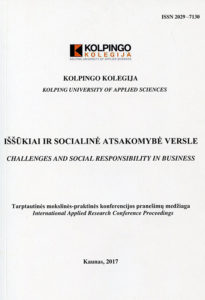
Proceedings of the International applied research conference “Challenges and social responsibility in business”, Kolping University of Applied Sciences (Lithuania) (ISSN 2029-7130), indexed in EBSCO HOST data base.
Publication “Hybrid model for professional and innovative development of Social work” by prof. Skaidrīte Gūtmane, Rector of LChrA. An article with the same topic was published in the Proceedings of the International applied research conference “Challenges and social responsibility in business”, Kolping University of Applied Sciences (Lithuania) (ISSN 2029-7130), indexed in EBSCO HOST data base.
Publications by Dr. Lāsma Dobele, Module Leader.
An article by the Module Leader Dr. Lāsma Dobele “The legal framework and support instruments for social entrepreneurship development in Latvia” published in Research Proceedings of LChrA, Vol. 4 “The innovative content of Caritative social work and Entrepreneurship” (2016; ISSN 1691-3264).
2md article by Module leader Lāsma Dobele-Līcīte “Structure Development and Management of European Social Enterprise” in Research Proceedings of LChrA, Vol. 5 “The innovative content of Caritative social work and Entrepreneurship” (2018; ISSN 1691-3264).
Please ask for article in the Latvian Christian Academy Library and be prepared for discussions on Dr. Lāsma Dobele-Līcīte lectures and seminars!
Publication by Dr. Aivars Stankēvičs, Module teacher.
“Anthropological Discourse in the Context of European Social Entrepreneurship Development” in Research Proceedings of LChrA, Vol. 5 “The innovative content of Caritative social work and Entrepreneurship” (2018; ISSN 1691-3264).
You will learn quite innovative ideas how Judeo-Christian Tteological traditions stand behind modern European concepts of humans as free dignified and valued beings. The research is focused on the value of individual freedom of EU citizens. You will have ideas how radical is Judeo-Christian anthropological start and why this knowledge is necessary for the current European Social development.
Publication by Dr. Ivars Indāns, Module teacher.
“Associative Democracy Development and Processes of Migration in the EU” – please ask for the article copies in Latvian Christian academy Library. The article is facing key question – how to develop more associative forms of democracy in Latvia for balancing of the centralized State government and topical social problems, and needs of people, and how to overcome inner fragmentation of the social system? Solidarity cases will give certain attitudes to associative approach to the social process management in Latvia.
LEARNING TOOL “European Democratic Society: Associative Democracy and Civic Responsibility” published! Case study materials and analysis of European development of democracy and civil society. Reports and case analyses apply the concept of associative democracy and civic responsibility development in Europe. Materials and reflections of the process are taken from different European civil societies. Includes basic texts for students. 170 copies.
Please use this deliverable as case study material Compendium. You will find examples of welfare states (Denmark, Belgium, and other EU countries). Cases are chosen by your teachers Dr. Ivars Indāns, Dr. Aivars Stankēvičs, and Dr. Lāsma Līcīte.
Report on the Jean Monnet Module methodology in Vilnius. September 2017. Report on methodology of Jean Monnet Module prof. Skaidrīte Gūtmane in ERASMUS+ international seminar in Vilnius. Click for gallery under this post.
Invalid Displayed Gallery
Lectures from the Team of young researchers. 5 lectures by 5 teachers from the Team of young researchers amounting 80 hours have been delivered to students who do not automatically come into contact with the EU studies (Social work, Theology, Church art, Supervision etc.) at Latvian Christian academy.
CONGRATULATIONS! THE LAW ON SOCIAL ENTREPRENEURSHIP was passed by Latvian Parliament. The Law is in force from April 1, 2018.
Report on Jean Monnet Module implementation by prof. Skaidrīte Gūtmane in ERASMUS+ contact seminar unit in Rome, Italy. October 18-19, 2017. Report on Jean Monnet Module implementation by prof. Skaidrīte Gūtmane in ERASMUS+ contact seminar with Southern Mediterranean countries organized by European Commission’s DG Education and culture unit in Rome, Italy. Click for gallery under this post.
Invalid Displayed Gallery
Team lectures done within the Jean Monnet Module framework in 2018/2019:
- 3 young researchers delivered planned lectures during 2017/2018,
- “The European Social Market Economy” (16 hours),
- “Associative Democracy Development in EU” (16 hours),
- “Anthropological Discourse in the Context of Methodological Innovations in Social Entrepreneurship” (16 hours),
- “Structure Development and Management of Social Enterprise” (16 hours),
- “Capital Investment and Foundations of Social Enterprise” (16 hours).
Methodology:
In the last year of the Module Implementation it is obvious that students-centered interactive teaching and learniong sessions were effective: narrative learning, presentations of case studies, critical expression of thoughts, different examples from SE practice increased students’ taste for appreciation of European Social Agenda. In team of 2 people students trained themselves to prepare SE business plans – it was practical tool for thinking independently and developing inner potential of students. Impact-oriented methodology deepened teaching and learning policy.
The interdisciplinarity of the Module methodologically connected SE and the EU Social Policy strategy, including “European White Paper on Future of Europe” (2017) combined with solidarity approach. It was innovative thinking developed.
Students questionnaires on quality performance were analyzed.
Team lectures done within the Jean Monnet Module framework in 2017/2018:
5 young researchers delivered planned lectures during 2017/2018:
- “The European Social Market Economy” (14 hours) – prof. Liesma Ose (September 15-16, 2017),
- “Associative Democracy Development in EU” (16 hours) – Dr. Ivars Indāns (October 27-28, 2017),
- “Anthropological Discourse in the Context of Methodological Innovations in Social Entrepreneurship” (18 hours) – Asoc.prof. Dr. Aivars Stankevičs (February 2-3, 2018),
- “Structure Development and Management of Social Enterprise” (18 hours) – Dr.oec. Lāsma Līcīte (February 16-17, 2018),
- “Capital Investment and Foundations of Social Enterprise” (14 hours) – Dr.oec. Ņina Linde (March 9-10, 2018).
Team lectures done within the Jean Monnet Module framework in 2016/2017:
5 young researchers delivered planned lectures during 2016/2017:
- “The European Social Market Economy” (14 hours) – prof. Liesma Ose (September 16-17, 2016),
- “Associative Democracy Development in EU” (16 hours) – Dr. Ivars Indāns (September 30 – October 1, 2016),
- “Anthropological Discourse in the Context of Methodological Innovations in Social Entrepreneurship” (18 hours) – Asoc.prof. Dr. Aivars Stankevičs (February 3-4, 2017),
- “Structure Development and Management of Social Enterprise” (18 hours) – Dr.oec. Lāsma Dobele (February 17-18, 2017),
- “Capital Investment and Foundations of Social Enterprise” (14 hours) – Dr.oec. Ņina Linde (March 3-4, 2017).
IMPACT AND DISSEMINATION
- Students – who do not automatically come into contact with the EU studies. They have been introduced to information and skills for independent research topics of the contemporary European Integration Social Agenda. Strong influence on them for promotion for civic participation skills. They are well positioned to understand integrative approach of European integration in the field of their study programs. Module has become a knowledge pool for adaption to changes of European social and economic structures.
- Academic society – impact by publications from the young researchers’ team. By voluntary participation of EZA (“European Center for Workers’ Questions”) – 39 EZA partner organizations and EZA international seminar,
- Policy makers from Latvian Parliament. The Law on Social Entrepreneurship was made in force in April 1, 2018,
- Social entrepreneurship, Social work business association.
Report on Jean Monnet Module, 1st year results, was submitted in October 24, 2017.
All planned activities for the 1st year of the Module were fulfilled fully.
Seven (7) additional activities were performed, including published research articles by young researchers, presentations of the implementation of the Module in two international ERASMUS+ contact seminars and international EZA (“European Center for Workers’ Questions”) seminar.
